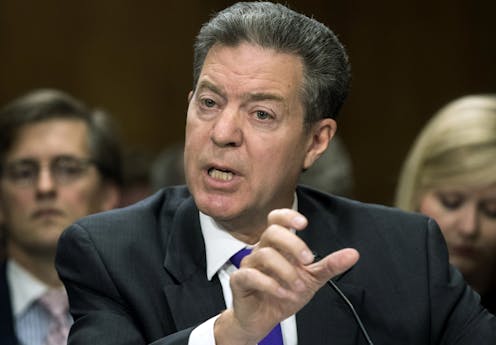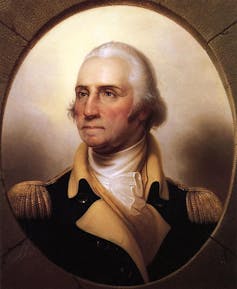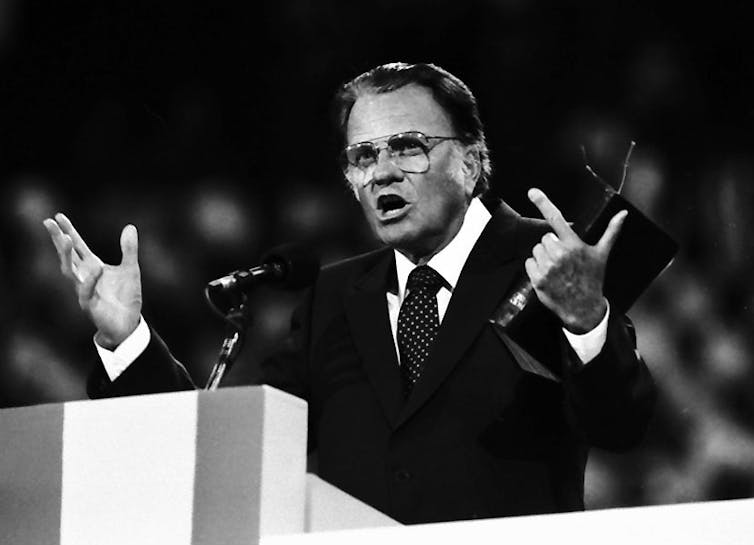What's behind America's promotion of religious liberty abroad
America has been promoting religious liberty abroad since its founding, but there has always been disagreement on what exactly it means.

On Jan. 24, the Senate confirmed Sam Brownback, the governor of Kansas – a Methodist, who converted to Catholicism and today attends an evangelical church – for the position of ambassador-at-large for international religious freedom. On Jan. 30, President Donald Trump touted in his State of the Union address the “historic actions to protect religious liberty” as a major achievement of his administration.
Brownback’s victory was a razor thin 50-49. Conservative leaders, who know Brownback as an ally in the fight against abortion and homosexuality, were quick to lavish praise with Southern Baptist leader Russell Moore calling him “an outstanding choice.” Democrats, on the other hand, criticized Brownback for rolling back LGBTQ protections in Kansas.
As a historian of religion and foreign policy in the United States, I know that this is not the first time Americans have disagreed about the meaning of religious freedom. The United States has, in fact, been promoting religious liberty abroad since its founding, but there has always been disagreement on what exactly it is.
Religion and American empire
In 1775, in the early days of the American Revolution, George Washington prepared the Continental Army to invade the Canadian colonies in order to convince the inhabitants to join the rebellion against the British. As Colonel Benedict Arnold prepared to lead the charge, Washington warned him to respect the religious liberty of Catholics in Quebec and avoid unnecessary conflict. He wrote:
“While we are Contending for our own Liberty, we should be very cautious of violating the Rights of Conscience in others.”

Washington’s advice was followed in Canada but not in the newly founded United States, where Catholics found themselves facing discrimination.
Although Congress passed the First Amendment to the Constitution in 1791, religious liberty applied only to “respectable” Protestant denominations, like Baptists and Methodists, who grew rapidly in the first decades of the 19th century. As historian David Sehat explains Protestant denominations created a “moral establishment” that acted like official churches did in Europe. As in Europe, this moral establishment persecuted minority faiths, like Catholics, Mormons, Seventh Day Adventists, Jews and Jehovah’s Witnesses.
A way of projecting American power
America’s record of promoting religious liberty abroad was also spotty. Religious liberty largely meant the rights of missionaries to go out and convert “heathens” to Protestant Christianity.
For example, government agents and missionaries in the 19th century trampled on the religious rights of conquered Native American nations by taking away their children and placing them into faraway residential schools that forbade them from practicing their native faiths. The United States banned certain native religious ceremonies, like the Ghost Dance, because of fears that the ritual stirred up rebellion.
In 1898, the United States went to war with Spain and took possession of the Philippines and Puerto Rico, Spanish colonies that were both predominantly Catholic. As historian Tisa Wenger has pointed out, promoting religious freedom in the colonies was a way for the United States to expand its empire. The idea that the United States would spread religious freedom through its policies made Americans feel like liberators even when they acted like conquerors.
According to historian Anna Su, the United States attempted to remake these colonies in its image by separating church and state and divesting Catholic religious orders of their property. President William McKinley reasoned that the Filipinos could not be trusted to make that separation themselves.
Ironically, the American claim that promoting religious freedom in the world was its sacred mission was one of the reasons the country became an empire.
Two versions of religious freedom
Many Filipinos, Puerto Ricans and Native Americans demanded the right to worship freely and to organize their lives as they saw fit. Their appeals, however, fell on deaf ears until the early 20th century, when liberal Protestants and Jews began championing a vision of religious liberty aimed at protecting minority rights, not just the rights of the Christian majority.
These progressives wanted to disassociate religious liberty from empire and promote it through international law. Lutheran academic O. Frederick Nolde led a liberal Protestant effort to enshrine religious liberty in the Universal Declaration of Human Rights in 1948.
For Nolde, religious freedom was important among other human rights, including social and economic rights. He argued that people had the right to live free from discrimination and that religious freedom was one of the ways of protecting minorities from the tyranny of the majority. Nolde was hired by Federal Council of Churches, one of the most powerful religious lobbies in the United States.
Nolde and his associates were in the vanguard. It was only over time that the liberal Protestant and Jewish communities came to be more accepting of same-sex relationships and more supportive of church-state separation and other causes to protect minorities.
Evangelical view
Meanwhile, evangelicals and conservative Catholics embraced a different version of religious freedom, one that had the promotion of Christianity at its heart.

Evangelist Billy Graham, for example, worried in the 1950s that the Soviet Union was promoting atheism across the world, so he highlighted the country’s oppression of religious people and called on the United States to do more to free them. At home Graham opposed many of the court decisions that removed Bible reading and prayer from public schools.
Ironically, many conservatives seemed to believe that religious liberty was largely for people abroad, not at home. They opposed court decisions that they saw as infringing on the rights of Christian communities to pass on their values to their children. Evangelicals were also skeptical about Catholics having a more prominent role in American society, especially following the election of John F. Kennedy in 1960.
Religious freedom abroad?
More recently, the legislation that created the position of ambassador-at-large for international religious freedom – Brownback’s new job – was in essence, the result of evangelical concern over the persecution of Christians in China and the Middle East in the 1990s.
It was under pressure from evangelical groups, such as the Christian Coalition, the Southern Baptist Convention and the National Association of Evangelicals, that Congress, in 1998, passed the International Religious Freedom Act to do more to protect Christians abroad.
The bill gained support among more liberal Protestant, Catholic and Jewish communities as well, along with secular human rights groups. But disagreements about religious liberty remained. While evangelicals were fretting over the fate of Christian communities, progressive groups wanted to see religious freedom as part of a broader human rights agenda.
To the progressives, religious freedom was part of a larger canvas of human rights issues. It was no surprise that President Barack Obama, for example, appointed Suzan Johnson Cook, a religious leader with a passion for human rights and subsequently David Nathan Saperstein, Brownback’s predecessor. Saperstein was a rabbi who had advocated on a range of social justice issues.
These appointments were in keeping with progressive beliefs. As political theorist Elizabeth Shakman Hurd explains, religious freedom could not be isolated from many social, economic and political forces that lead to conflict. Elevating religious concerns above other human rights issues could, in fact, lead to more harm than good.
The question now is whether Brownback will treat religious freedom as a human rights issue or use the position to promote the interests of Christian abroad?
Gene Zubovich does not work for, consult, own shares in or receive funding from any company or organization that would benefit from this article, and has disclosed no relevant affiliations beyond their academic appointment.
Read These Next
Cuba’s speedboat shootout recalls long history of exile groups engaged in covert ops aimed at regime
From the 1960s onward, dissident Cubans in exile have sought to undermine the government in Havana −…
Drug company ads are easy to blame for misleading patients and raising costs, but research shows the
Officials and policymakers say direct-to-consumer drug advertising encourages patients to seek treatments…
Bad Bunny says reggaeton is Puerto Rican, but it was born in Panama
Emerging from a swirl of sonic influences, reggaeton began as Panamanian protest music long before Puerto…





